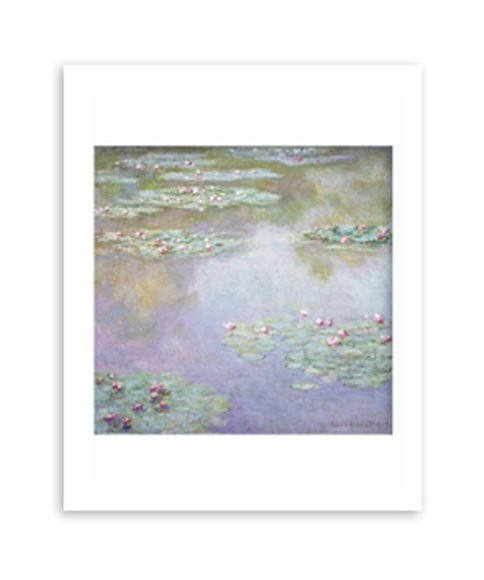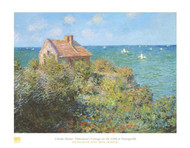The Enduring Legacy of Claude Monet and His Impact on the Art World
Feb 28th 2024
Claude Monet, a founding father of French Impressionist painting, has left an indelible mark on the world of art, revolutionizing the way we perceive, engage with, and create art. His unique style and approach to painting have profoundly influenced generations of artists and continue to captivate art lovers around the globe.
This article delves into the impact of Monet's art on the art world and explores why people remain enamored with his style. We’ll also cover why Monet art prints might be the best way to experience his beloved art today.
A Revolutionary Approach to Light and Color
Monet's most significant contribution to the art world is his innovative use of light and color. Prior to the Impressionists, artists often worked in studios, relying on predetermined formulas and techniques to depict their subjects.
Monet broke away from these conventions, choosing instead to paint en plein air (outdoors) to capture the ever-changing effects of light and atmosphere on the landscape. His focus on the transient nature of light, combined with his loose brushwork and vibrant color palette, allowed him to convey a sense of immediacy and movement that was revolutionary at the time.

Monet's series paintings, such as those of the Rouen Cathedral, haystacks, and water lilies, demonstrate his deep interest in the subtle nuances of light and color.
By painting the same subject at different times of the day and in various weather conditions, he documented the changing effects of light and atmosphere with meticulous attention to detail. This approach not only highlighted the subjectivity of perception but also challenged the traditional notions of time and space in art.
Influence on Modern and Contemporary Art
Monet's innovations laid the groundwork for modern art movements such as Post-Impressionism, Fauvism, and Abstract Expressionism.
Artists like Vincent van Gogh, Henri Matisse, and Jackson Pollock were influenced by Monet's emphasis on light, color, and expression over realism. His techniques encouraged future generations of artists to explore their perceptions and emotions, leading to the development of new artistic languages and styles.
The concept of Impressionism, as pioneered by Monet, also paved the way for contemporary art practices that prioritize the artist's personal expression and the deconstruction of traditional forms. His work has inspired countless artists to experiment with color, light, and brushwork, pushing the boundaries of what art can be and how it can be interpreted.
Why People Still Love Monet's Style
Monet's style continues to resonate with people for several reasons.
First, his paintings evoke a sense of tranquility and beauty, offering viewers an escape from the hustle and bustle of modern life. The dreamlike quality of his water lily ponds, the serene beauty of his landscapes, and the vibrant atmosphere of his urban scenes provide a sense of peace and contemplation.
It’s this signature “dreamy” quality that resonates with people through his works. Whether you are a longtime student of the arts or a casual fan, most people who have seen Monet’s works agree that there is a relatable energy to them. Without being overly realistic they seem to capture the “essence” or emotion of a setting. This makes his artwork particularly appealing, especially for those who aren’t necessarily drawn to post-modern and more abstract styles of art, or the hyperrealism of the Renaissance. Monet’s work is a happy medium between the two that satisfies the need for form without being too specific or caged in by realism.
Additionally, Monet's work is accessible and relatable. While deeply innovative, his subjects — gardens, seascapes, and everyday scenes — are familiar and universal. This accessibility, combined with his masterful use of color and light, makes his work appealing to a wide audience. There’s nothing too offputting, grim, or outlandish in his works. They are subtle and immediately recognizable, while also being emotionally satisfying. It’s a unique combination that has given his work staying power over the years.
Finally, Monet's art continues to inspire because it represents a celebration of nature and a commitment to capturing the world's beauty. In an age where digital technology and urbanization dominate, his paintings remind us of the value of observation and the importance of preserving our natural surroundings.
There is still a surprising draw toward art that highlights the simplicity of bygone eras, and nature as well. Monet’s work seems to capture this as well, which makes his art a refuge from the hustle and bustle of the modern world.
Monet Prints That Honor His Legacy
There’s an easy way to bring Monet’s art into your home, and that’s with the help of our high-quality monet art prints. Here at the Museum of Fine Arts, Boston, we feature a variety of products that highlight the work of this great artist. From throw pillows to puzzles, we offer a wide variety of options for anyone interested in enjoying his work.
However, Monet prints are probably the most straightforward way of enjoying his work outside of visiting us and viewing his beautiful Impressionist paintings for yourself firsthand. Here in our online Museum gift shop you will find a variety of different art prints and posters featuring Monet’s work. Browse through our collection and find something that resonates with you!
Looking back at his impact, Claude Monet's legacy in the art world is clearly immeasurable. His revolutionary approach to painting has not only influenced countless artists but has also changed the way we perceive and appreciate art. Monet's enduring popularity lies in his ability to capture the fleeting moments of beauty in the world around us, reminding us of the power of observation and the endless possibilities of light and color. As we continue to face a rapidly changing world, the timeless beauty and innovative spirit of Monet's art remain as relevant and beloved as ever.

